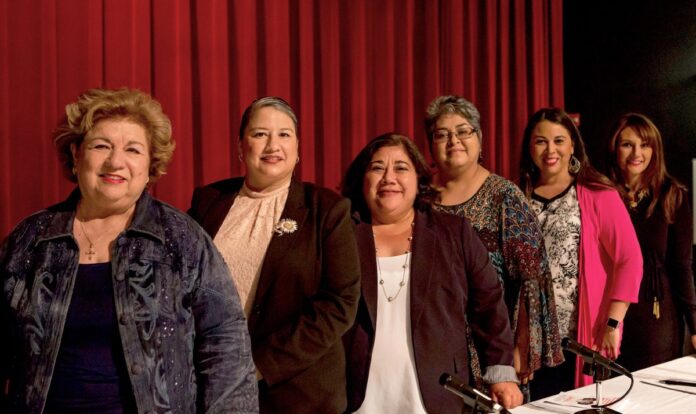BY Gail Fagan
Four female Rio Grande Valley mayors shared their experiences as public officials at the “Mujeres in RGV Politics” panel, held March 30 at The University of Texas Rio Grande Valley.
The discussion, moderated by Veronica Gonzales, UTRGV vice president for Governmental and Community Relations and former state representative for Texas District 41, was sponsored by the Mexican American Studies Program to celebrate Women’s History Month.
Dr. Stephanie Alvarez, UTRGV graduate director of Mexican American Studies, described the limited representation of women in the Valley, given that 51 percent of the population is made up of females.
“There are 46 towns and cities in the Rio Grande Valley and, of those, only seven elected mayors are women,” she said. “Even on the school boards, women make up just 23 percent of the elected seats on those boards. We decided to investigate why there is such a disparity among our elected officials.”
The mayors participating in the panel – Celeste Sánchez, San Benito; San Juanita Sánchez, San Juan; Alma Morón, La Villa; and Yvette Cabrera, Granjeno – shared their family backgrounds, motivations to run for political office, what qualities women bring as office-holders, the challenges they face as female elected officials, and how to encourage more women to run for office.
Celeste Sánchez, assistant school superintendent of Curriculum and Instruction for the San Benito CISD, was a former commissioner and became mayor in 2014.
She said her dad always told her, “if you are not at the table, you can’t pick the menu.” That advice eventually led her to seek public office to make a difference in her community.
“Women often listen to that inner voice that says ‘We can’t.’ Therefore, we are shy, ladylike, and we don’t take that initiative,” she said. “You have to fight that little voice and put in another voice that says, ‘I can.’”
Cabrera said she had always been involved in her small community when she was approached in 1998 at age 19 to take an appointment to be a city commissioner. After serving numerous terms as a commissioner, she won election as mayor in 2012.
“When you decide to run for office, you need to know who you are working with and who you are going to be working for. That makes the job much easier,” she said.
San Juanita Sánchez, a lawyer, described running unsuccessfully for various offices before being elected mayor the first time in 2005, winning that race by only three votes. She was elected again in 2011.
You have to have passion for public service and the causes you believe in, she said.
“Don’t do it because you think you are going to get honor and glory,” she said. “You have to love the community, the people and the cause.”
Morón, who once worked as secretary for the La Villa school district superintendent, said an interest in public education and a concern about excessive spending in her community stirred her desire to run for office.
Elected less than a year ago in a contentious race, Moron said it took her 12 years to earn her college degree, but education was key to her involvement in politics. She started going to public meetings, where she made her voice known before later running for office.
“I knocked on every door in La Villa,” she said. “I told people who asked about a female running and how I could make a difference that, one, I live here and I want to make sure my town prospers; and two, I am a woman and women by nature are multi-taskers. We can handle a bunch of stuff.”
The panelists all agreed that the best part of the job is being able to make a difference in people’s lives, but the role is full of challenges requiring perseverance, sacrifice, collaboration and a “tough skin.”
The mayors also described ways they have tried to encourage more women, as well as men, to participate in and understand the government process.
“When people have the knowledge about where the taxes come from and where they go, people will come out and be involved,” said Celeste Sánchez, who established a Citizens Academy in San Benito to help people be informed and learn how to participate.
San Juanita Sánchez said women need to see more women in office, so they can identify with them and see that they can juggle family and other responsibilities successfully while holding office.
“I take opportunities to talk to young ladies about running for office. It has to start young. We must continue to invite women to be part of campaigns and serve on committees,” she said.
At the panel and Q&A session conclusion, Gonzales praised the mayors as hardworking, innovative and collaborative.
“They look for ways to solve problems, and who doesn’t want that in their elected officials,” she said.
Gonzales said women bring a unique and vital perspective to the table.
“Like you want to have a jury of your peers, you also want to have a government of your peers. You want to know that women have a place there, as well as men,” Gonzales said.
Undergraduate students interested in having a greater representation in elected office or who are interested in a career in politics, policymaking, or public service, can apply to participate in the New Leadership Texas Institute at the University of Texas at Austin’s Center for Women’s & Gender Studies. A limited number of scholarships are available.




